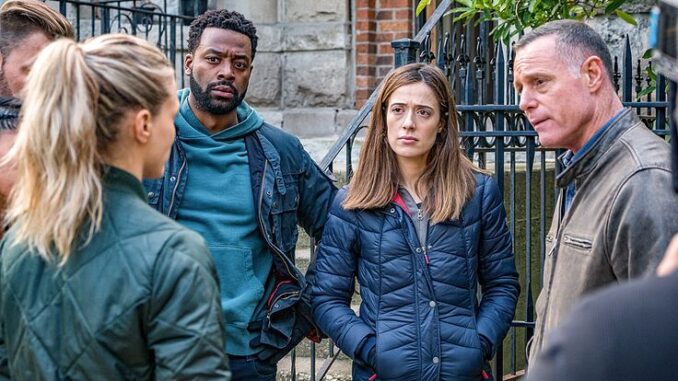In a franchise built on grit, loyalty, and the high-stakes world of Chicago’s elite police units, Detective Hailey Upton’s exit from Chicago P.D. in Season 12 has delivered one of the most emotionally complex and narrative-altering twists the series has ever seen. What makes her departure sting isn’t just that fans are losing a fan-favorite character. It’s that her exit introduces a shift that many viewers never wanted to see—one that threatens to reshape the show’s emotional heart and team dynamics in ways that are already being felt across Intelligence.
From the moment Upton, played with intensity and layered vulnerability by Tracy Spiridakos, stepped into the squad room, she was never just another detective. Her character brought a tenacious work ethic, emotional depth, and an evolving sense of justice that made her arc one of the most compelling in the One Chicago universe. But now, with her sudden departure, fans are asking: what happens when the emotional glue holding several key relationships together disappears?
The Emotional Fallout
Upton’s storyline has never been simple. Haunted by a traumatic childhood and hardened by years on the job, she was a character built on contradiction—tough yet empathetic, guarded yet yearning for connection. Her partnership and eventual romance with Jay Halstead (played by Jesse Lee Soffer) became one of the show’s most emotionally resonant subplots. When Halstead left in Season 10, many fans held on to Upton as the last thread of their beloved “Upstead” dynamic.

Her unwavering loyalty to him, even in his absence, became a point of heartbreak and character growth. We saw her struggling to balance her role in Intelligence with the emotional weight of his decision to leave. Now that Upton is gone too, fans are left mourning the loss of a bond that, though broken, still grounded much of the show’s emotional undercurrent.
Voight and Upton: A Complicated Mentor-Protege Bond
Beyond Halstead, Upton’s bond with Sergeant Hank Voight was arguably just as critical to the show’s DNA. It was a complicated, often tense relationship built on mutual respect, blurred lines, and unspoken battles over justice versus morality. She wasn’t afraid to challenge Voight, and he saw in her the makings of a leader—possibly even his successor.
Upton was never just another detective to Voight; she was a kindred spirit in many ways, someone who carried the weight of the badge without losing her soul entirely. Now, with her exit, Voight is left more isolated than ever—a man who has lost most of his inner circle, and perhaps, the last person who could keep him tethered to a more ethical version of himself.
What This Means for Intelligence
With Upton gone, the Intelligence Unit faces not just a personnel gap, but an identity crisis. She wasn’t just another warm body filling a spot; she was part of the unit’s moral compass. Her unique mix of tactical brilliance and emotional intuition allowed her to read suspects, victims, and fellow detectives with unparalleled precision. She brought a humanity to Intelligence that often stood in contrast to the brutal nature of their work.

Her departure, especially coming so soon after Halstead’s, leaves Intelligence dangerously imbalanced. The emotional maturity and perspective she brought to the table will be sorely missed—by her team and by fans.
A Twist Fans Didn’t Want
The most jarring aspect of Upton’s exit isn’t just the fact that she’s leaving—it’s the direction it may push the series in. For years, Chicago P.D. has walked a tightrope between adrenaline-pumping action and emotionally rich character development. With Upton gone, there’s a real concern that the balance might tip too far toward the procedural, losing the deeply human storytelling that has set the show apart.
Fans are already speculating about who might fill her shoes. Will a new character step in, one who disrupts the chemistry of Intelligence even further? Or will existing characters be reshaped to cover the emotional gaps left behind? Either way, it’s clear that Upton’s departure is more than a simple cast change—it’s a seismic shift.
Tracy Spiridakos: A Graceful Exit
While fans may be mourning Upton’s absence, many are also praising Tracy Spiridakos for the depth and grace she brought to the role. Her final episodes were handled with quiet power and subtlety—echoing the character’s core identity. She didn’t go out in a blaze of gunfire or melodrama, but with quiet resolve, staying true to who Hailey Upton has always been.
Spiridakos leaves behind a legacy of one of Chicago P.D.’s most complex female characters—one who navigated loss, betrayal, duty, and love with a fierce resilience that fans will never forget.
What’s Next?
There’s no denying that Upton’s departure opens up a world of possibilities. It forces the show to re-evaluate its character dynamics, its emotional stakes, and its future direction. But it also raises a difficult question: can Chicago P.D. still feel like Chicago P.D. without her?
As the series marches toward its thirteenth season, the writers will need to tread carefully. Viewers are loyal, but they’re also deeply invested in the emotional continuity of the characters. Too much change, too fast, could leave the show feeling unrecognizable.
Hailey Upton was never meant to be a placeholder. She was a powerhouse. Her journey was raw, complicated, and utterly real. Her departure marks the end of a significant chapter in Chicago P.D. history—a chapter that fans weren’t ready to close. Whether her absence will serve as a catalyst for bold storytelling or mark the beginning of a decline remains to be seen. But one thing’s for sure: Upton’s goodbye has left behind more than just an empty desk at Intelligence. It’s left a gaping hole in the hearts of fans—and in the soul of the show itself.





